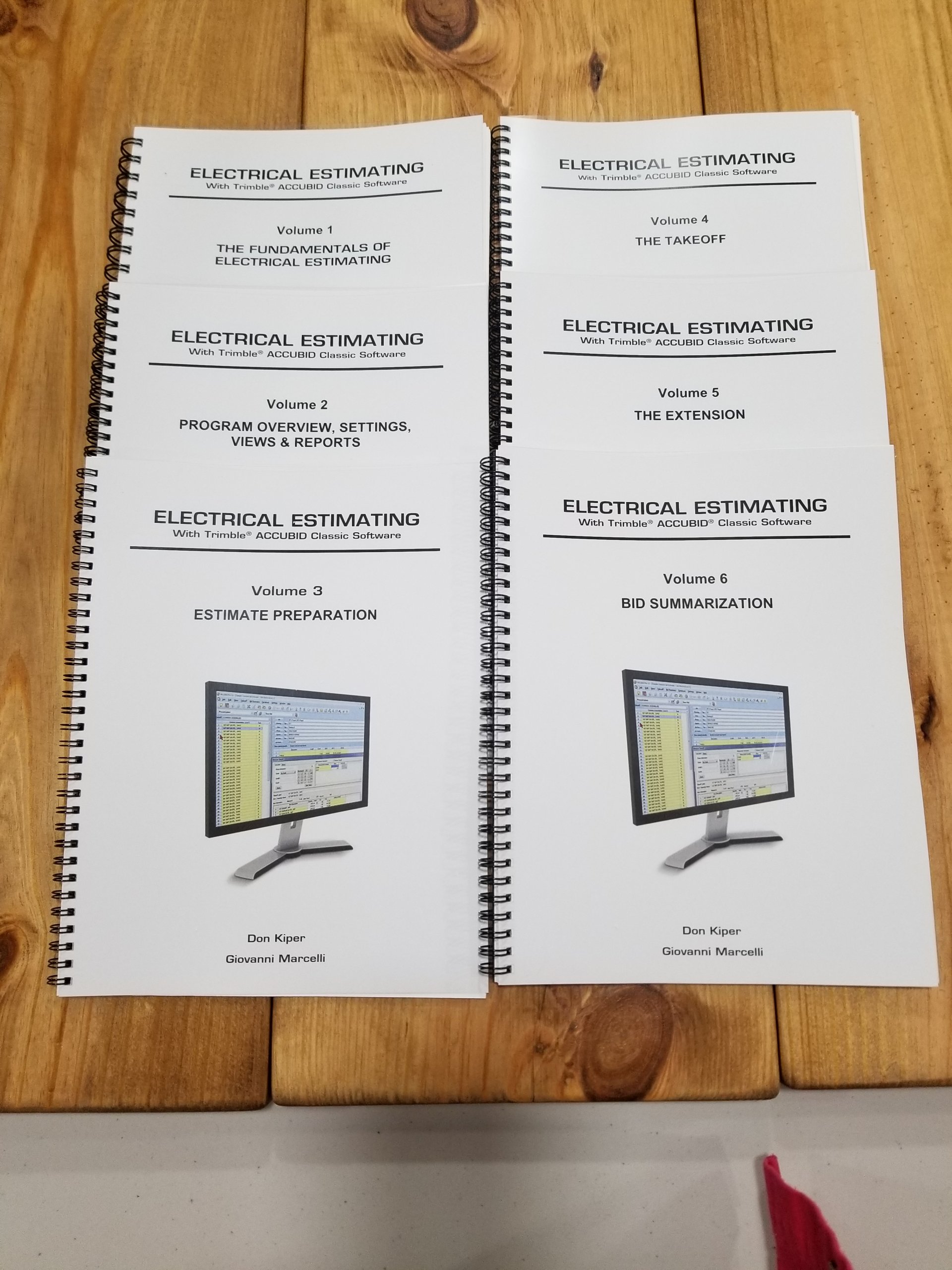Volume Detailed Content
Volume 1 – The Fundamentals of Electrical Estimating
Chapter 1 – Introduction to Electrical Estimating
Chapter 2 – Estimating Principles
Chapter 3 – The Estimator
Chapter 4 – Estimating Tools
Chapter 5 – Organization
Chapter 6 – Material Basics
Chapter 7 – Understanding Labor
Chapter 8 – The Estimating Sequence
Chapter 9 – Detailed Takeoffs
Chapter 10 – Advanced Estimating Principles
Chapter 11 – Things an Estimator Should Know
Volume 2 – Program Overview, Settings, Views, & Reports
Chapter 1 – Introduction to Trimble® ACCUBID Software
Chapter 2 – Program Overview
Chapter 3 – Job Schedule Screen
Chapter 4 – Program Settings & Defaults
Chapter 5 – Reports & Views
Volume 3 – Estimate Preparation
Part 1 – Estimating Fundamentals
- Chapter 1 – The Contract Documents
- Chapter 2 – Estimate Preparation
- Chapter 3 – Pre-Bid Meeting & Site Investigation
Part 2 – Estimating Sequence
- Chapter 4 – The Estimating Sequence – Steps 1 -14
Part 3 – Trimble ® Accubid Lessons
- Chapter 5 – Starting A New Estimate
- Chapter 6 – Structuring the Estimate
Volume 4 – The Takeoff
Part 1 – Estimating Fundamentals
- Chapter 1 – Introduction to Takeoff
- Chapter 2 – Estimating Technique
- Chapter 3 – Installation Labor Factors
Part 2 – The Estimating Sequence
- Chapter 4 – The Estimating Sequence – Steps 15-19
Part 3 – Trimble ® Accubid Lessons
- Chapter 5 – Takeoff Basics
- Chapter 6 – Performing Takeoffs
- Chapter 7 – Advanced Takeoff
- Chapter 8 – The Audit Trail
Volume 5 – The Extension
Part 1 – Estimating Fundamentals
- Chapter 1 – The Importance of the Extension
- Chapter 2 – Checking the Takeoff
- Chapter 3 – Focus on What Matters
Part 2 – The Estimating Sequence
- Chapter 4 – The Estimating Sequence – Steps 20 – 28
Part 3 – Trimble ® Accubid Lessons
- Chapter 5 – Introduction to the Extension Screen
- Chapter 6 – Extension Screen Basics
- Chapter 7 – Material & Labor Review
- Chapter 8 – Analyzing the Takeoff
Volume 6 – Bid Summarization
Part 1 – Bid Summary Fundamentals
- Chapter 1 – Introduction to Bid Summarization
- Chapter 2 – Project Labor Factors
- Chapter 3 – Summarizing the Estimate
- Chapter 4 – Labor Summary and Costs
- Chapter 5 – Bid Day
- Chapter 6 – Checking the Bid Summary
Part 2 – Trimble ® Accubid Lessons
- Chapter 7 – Bid Summaries
- Chapter 8 – Closing the Project
- Chapter 9 – Key Indicators
- Chapter 10 – Multi-Level Breakdowns
Volume Summary
Volume 1 – Fundamentals of Electrical Estimating – This volume will provide the estimator with a solid foundation for producing accurate and detailed estimates. Just as no building will stand very long without a good foundation, no estimator will be successful in the profession of electrical estimating without a solid understanding of proper estimating principles.
Volume 2 – Overview, Settings, Views & Reports in Trimble® ACCUBID Software – Trimble® ACCUBID Classic software provides the contactor the ability to have an organized project schedule screen for easy sorting and filtering. The Job Schedule screen allows the contactor to track total volume of estimates as well as first, second, and third place bids. Reporting is customizable for any printouts desired. You will learn how to set up company preferences in the Default Project.
Volume 3 – Estimate Preparation – Preparation is key to perform an accurate estimate. This preparation will require a careful examination of the contract specifications and drawings. When the estimator attends the project’s pre-bid meeting, he must be prepared beforehand and know how to conduct a site examination of a project. Properly setting up an estimate before quantifying the project is vital.
Volume 4 – The Takeoff – One of the main responsibilities of the estimator is an accurate quantifying of the project. Every estimator must develop a technique that allows for an accurate, detailed, organized takeoff. The estimator must know the difference between estimating and bidding. Estimating is the quantification of the project. Bidding is the summarization of the project. The estimator must provide a complete list of all direct material and labor costs for a detailed takeoff. Having a knowledge of labor factoring is necessary to arrive at an accurate direct labor hour total.
Volume 5 – The Extension – The Extension Screen gives the estimator the power to check, analyze, and modify a consolidated takeoff. The program allows items on the Extension Screen to be filtered by material and labor options. The Grouping feature provides a quick analysis of the project by Bid Item, Area, Phase, and System. The Sort Code feature is a powerful option that allows the estimate to be closely reviewed for portions with the largest risks.
Volume 6 – Bid Summarization – The Bid Summarization, sometimes referred to as the Bid Recap, must be complete. The Bid Summary feature in Trimble® ACCUBID Classic software is outstanding and provides the contractor with great flexibility in summarizing the estimate. An accurate takeoff can be useless if the project is not properly summarized.
ADDITIONAL INFORMATION
Sets of Manuals
1 Set, 2 – 5 sets (10% off),
6 – 9 sets (15% off),
10 or more sets (20% off)

